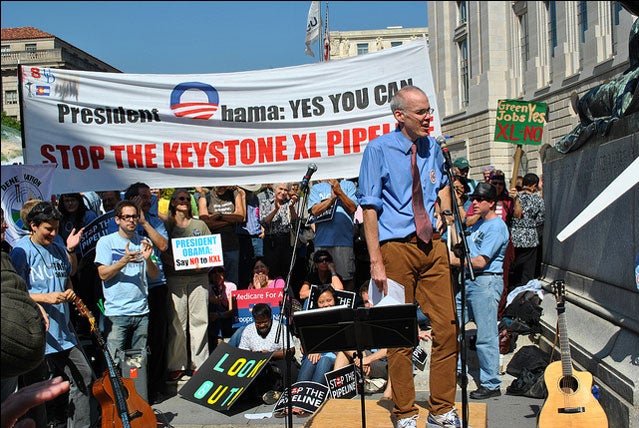By this point, everyone knows that the Keystone XL Pipeline is an environmental disaster in the making—that’s what happens when twenty of the nation’s top scientists sign a to the president stating “categorically that it’s not only not in the national interest, it’s also not in the planet’s best interest.”
And by this point, everyone knows it’s an ethical disaster—that’s what happens when ten Nobel Peace Prize laureates (right up to the Dalai Lama!) issue a explaining that Your rejection of the pipeline provides a tremendous opportunity to begin transition away from our dependence on oil, coal and gas and instead increase investments in renewable energies and energy efficiency.
By now, there’s only one argument left standing for proponents of the planned 1700-mile pipeline from the tar sands of northern Alberta to the Gulf of Mexico. That argument is jobs, jobs, jobs—and they’ve been making it with gusto. At first they were relatively circumspect—the head of Transcanada Pipeline talked about the pipeline creating 20,000 temporary jobs. But soon rightwing politicians upped the figure . The U.S. Chamber of Commerce, which spends much of its time figuring out how to make it easier for U.S. corporations to outsource their workforces overseas, has been the highest bidder: it’s director, Thomas Donohue, has thundered from a dozen podiums the promise that the pipeline would .��
Which is a lot. It’s as many jobs as the whole American economy creates in the course of a normal month these days. Were it true—well, it probably still wouldn’t outweigh the destruction of the planet, but it would make for an interesting ethical balancing act.
Unfortunately, it isn’t true. In fact, it’s the purest kind of nonsense, apparently based on some extrapolation of the total economic activity such a pipeline would generate over the next century, an extrapolation performed by some consultant hired by pipeline proponents. These proponents—people like the Koch Brothers, who run a big tar sands operation—are people who don’t trust climate models built by the smartest physicists and chemists, yet they’re willing to tout some jobs estimate they got from a consultant who . (And who somehow missed the fact that the whole pipeline is only designed to last fifty years).��
In fact, there’s now been a rigorous study of the pipeline, performed by a group with roots not in industry but in the labor movement. The Cornell Global Labor Institute looked carefully at all the project specifications and : yes, it will create jobs. Somewhere between 2500 and 4650 people will be needed to build the pipeline. Those jobs will be temporary (once a pipeline is built it doesn’t take many people to run) but then construction jobs are by definition temporary. In our economy, even 2500 jobs are nothing to sneeze at.
But Cornell looked, too, at the jobs the new pipeline would kill. At the moment, the fairly small amount of oil from tar sands that makes it into this country has to head for a few refineries in the Midwest, and that’s helped lower the cost of gasoline in the region. With new markets for the crude overseas (most of Keystone XL’s oil will be exported), the Gulf of Mexico extension will raise the price of Chicago gas—and that will be enough to wreck as many jobs as it creates.
So—a wash. Except, not really. Because the pipeline will have another effect. It will tie us for another generation to fossil fuel, helping slow the switch to wind and solar. That switch is just beginning—but already there are more Americans employed in the solar industry than in, say, coal-mining. If we could ever decide to decisively break our addiction to fossil fuel, that jobs wave could become a tsunami—it takes a lot more people to put solar panels on America’s roofs than to build a single pipe.
Which is why America’s unions have split on the Keystone XL project. The Laborers, understandably, see pipeline construction as right up their alley and so have fought hard in support of the project. But the Transport Workers Union and the Amalgamated Transit Union, which have huge numbers of people who do green things like drive buses, have been outspoken in their opposition. Here’s how they put it in a joint last summer: “We need jobs, but not ones based on increasing our reliance on Tar Sands oil. There is no shortage of water and sewage pipelines that need to be fixed or replaced, bridges and tunnels that are in need of emergency repair, transportation infrastructure that needs to be renewed and developed. Many jobs could also be created in energy conservation, upgrading the grid, maintaining and expanding public transportation—jobs that can help us reduce air pollution, greenhouse gas emissions, and improve energy efficiency.”
In other words, they thought with care and complexity about an emotionally charged issue, instead of just framing it as jobs versus the environment. Would that our political class labor as hard.


